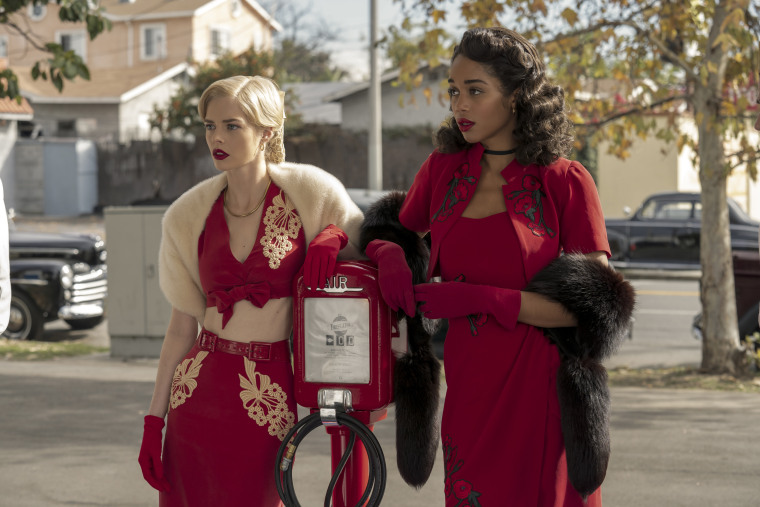From "Singin' in the Rain" in 1952 to the latest Quentin Tarantino film, Hollywood loves to trumpet its own glamour. Netflix's new seven-episode mini-series, "Hollywood," by Ryan Murphy and Ian Brennan of "Glee," seems to fit into that self-aggrandizing tradition, at least on the surface. But this tale of a successful, daring film production is actually more a tale of Hollywood’s missed potential. The series' sentimentality isn't a celebration; it's an indictment. If the movies are where dreams come true, "Hollywood" says, then Hollywood should be making better dreams.
If the movies are where dreams come true, "Hollywood" says, then Hollywood should be making better dreams.
The first episode of the series is thoroughly and irritatingly conventional. Set shortly after the end of World War II, the main character is Jack Castello (David Corenswet), a beautiful young man with little experience or talent who dreams of being a movie star. He's self-absorbed, overly confident, and about as introspective as the Hollywood sign. His irresponsibility has put himself and his pregnant wife on the verge of financial ruin. There's no reason to like him except that he's white, pretty, male and is presented to us as the star of the show.
But then something odd happens. The series realizes that Jack is a bore, and starts following other characters (some of them based on real people) — and other dreams. Archie Coleman (the staggeringly magnetic Jeremy Pope) is a black, gay writer, trying to sell a script about (of course!) Hollywood and its dreamers. Raymond Ainsley (Darren Criss) is a half Filipino director who wants to make a film that will reignite the career of woefully underutilized real Chinese-American star Anna May Wong (Michelle Krusiec). Raymond's girlfriend, Camille Washington (Laura Harrier), is a talented black actor who — like Jack but with more barriers — wants to be a movie star. Avis Amberg (Patti LuPone) is a Jewish former actress whose career was cut short because of prejudice. Married to the callously philistine Ace (Rob Reiner), the head of Ace studios, she discovers that her true calling is making films, not acting in them.
Obviously, Hollywood in 1947 was not welcoming to gay black writers, nor to black leading ladies, nor to Asian directors or female studio heads. For that matter, Hollywood in 2020 is still a tough place for the non-Jack Costello's of the world. As of this writing, only one black woman has ever won an Oscar for best actress (Halle Berry in 2001). It's been more than 60 years since Miyoshi Umeki became the first and only Asian American to win in the best supporting actress category.
Thus "Hollywood" the series is a fantasy. But what is Hollywood for if not to fulfill fantasies? In real life, gay male stars still frequently stay in the closet because of fears that audiences won't accept them as leading men. "Hollywood," though, allows the famously closeted actor Rock Hudson (played here by Jake Picking) to defy his flamboyantly profane and abusive agent Henry Willson (Jim Parsons) and announce his sexuality publicly, without destroying his career. In real life, studios were terrified of offending racist audiences and racist activists, especially in the South. In "Hollywood," people in power are brave enough to do the right thing, and doing the right thing makes the industry, and the country, a better place.
No doubt some will dismiss "Hollywood" as too politically correct and treacly, and it certainly is both of those things.
No doubt some will dismiss "Hollywood" as too politically correct and treacly, and it certainly is both of those things. The last episode, especially, is little more than a series of tearjerking set pieces. But beneath the sugary coating there's a bitter truth. The people of "Hollywood" are anti-racist, feminist fighters for LGBT rights who don't stigmatize sex workers and reject the abuses of the casting couch. They imagine a better world — and by doing so, they show how inadequate the industry's current actions are.
Quentin Tarantino's "Once Upon a Time in Hollywood," as one parallel example, is an alternate history of Hollywood in which tough, virile white cowboys beat up Asian Americans and hippies, and rescue white damsels in distress. The main change from reality is that the Manson family is stopped from murdering Sharon Tate. That's a pleasing dream — but if you're going to make a better Hollywood, why leave in place the racism, the sexism and the homophobia? Tarantino's tone is often sardonic and knowing, but the film's flinty swagger is oddly timid when it comes to actually changing the past. Murphy and Brennan's open-hearted bathos is much more tough-minded in its sweeping rejection of reality.
One of the best parts of "Hollywood" is its intro. While upbeat jazzy music plays, the cast climbs up scaffolding on the side of the iconic Hollywood sign. When one person misses a step, another catches them. White, black and Asian, male and female, straight and queer, give each other a hand as they reach for their dreams. It's manipulative, saccharine, ridiculous and glorious, just like Hollywood. Or rather, just like Hollywood should be.

